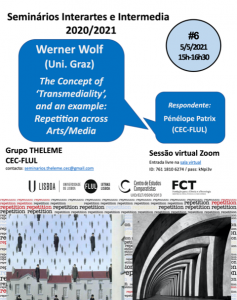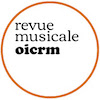 Séminaire « Interarts and Intermedia seminars » #6, « The Concept of ‘Transmediality’, and an Example: Repetition across Arts/Media », par prof. Werner Wolf, groupe THELEME, en ligne, 5 mai 2021, 15h (heure du Portugal).
Séminaire « Interarts and Intermedia seminars » #6, « The Concept of ‘Transmediality’, and an Example: Repetition across Arts/Media », par prof. Werner Wolf, groupe THELEME, en ligne, 5 mai 2021, 15h (heure du Portugal).
« Transmediality, in the sense used in this contribution, is a notion designed for media comparison and refers to the quality of ‘travelling concepts’ which allows them to be realised in several arts or media. While a transmedial, media-comparative perspective always involves more than one medium and is to this extent related to intermediality, not all scholars working in the field consider it a variant of genuine intermediality. In its first part, this contribution will, however, show that there are good reasons for integrating transmediality into a system of intermedial forms, although such classifications are ultimately of reduced relevance when one considers the heuristic benefits which a transmedial perspective can yield. Some of the benefits will be illustrated in the second part by means of an eminently transmedial phenomenon, namely repetition. A typical result of transmedial comparisons is that some media or media-specific genres can realize the transmedial phenomenon under discussion better than others. This is also the case with repetition. It will be pointed out that, owing to the tendential incompatibility between narrativity and large-scale repetition, the latter is more frequent in tendentially non-narrative media or genres such as instrumental music and lyric poetry than, e.g. in Wagnerian opera and the novel and that the tendency towards, or avoidance of, large-scale repetition can be used as an indicator of the narrative potential of a given medium or genre. Besides being mainly a contribution to inter- or transmediality studies, the lecture will thus also be relevant to narratology and the question of how to assess the narrative potential of individual media or genres. »
Ouvert au public.
Pour plus de détails : cliquez ici.
